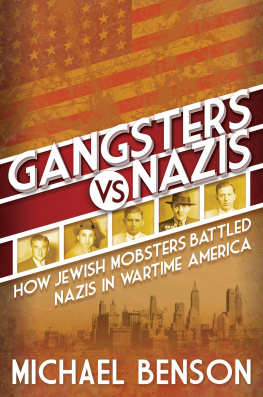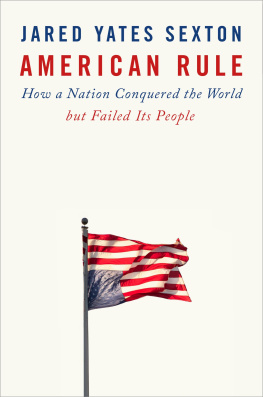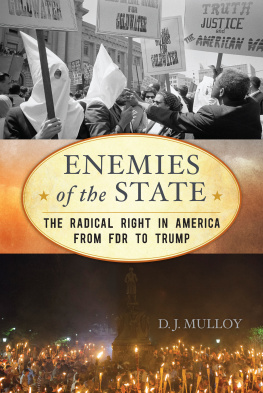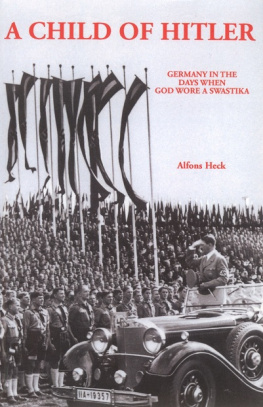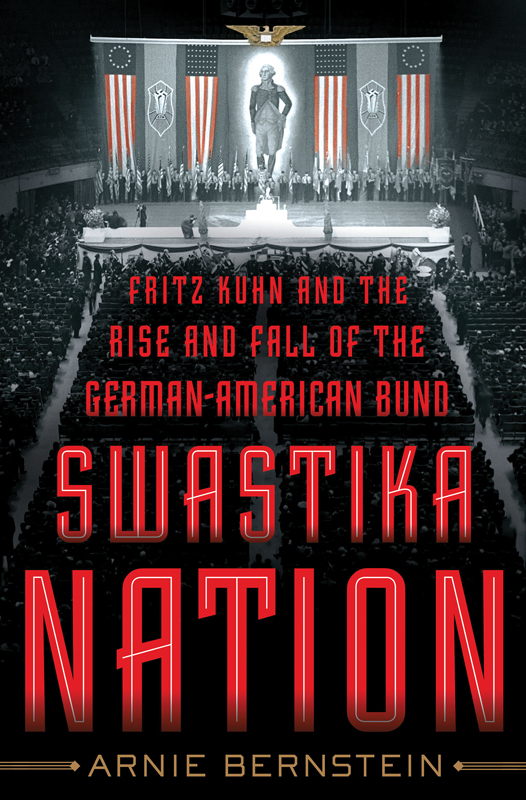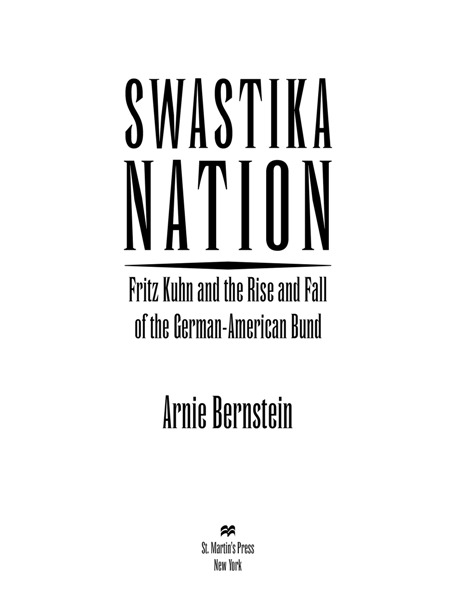
The author and publisher have provided this e-book to you for your personal use only. You may not make this e-book publicly available in any way. Copyright infringement is against the law. If you believe the copy of this e-book you are reading infringes on the authors copyright, please notify the publisher at: us.macmillanusa.com/piracy.
For Jan Pagoria
My guardian angel and true believer
CONTENTS
Our battlefield is right here, and here is where we must fight it out.
F RITZ K UHN, B UNDESFHRER , G ERMAN- A MERICAN B UND
In acts he was like a lion, and like a lions whelp roaring for his prey. And he pursued the wicked and sought them out, and them that troubled his people he burnt with fire.
M ACCABEES: CHAPTER 3, VERSES 45
When Der Fhrer says we is de master race
We heil pffft! heil pffft! right in Der Fhrers face
Not to love Der Fhrer is a great disgrace
So we heil pffft! heil pffft! right in Der Fhrers face
D ER F HRERS F ACE, O LIVER W ALLACE, POPULARIZED BY S PIKE J ONES & H IS C ITY S LICKERS
PROLOGUE
February 20, 1939
P ANDEMONIUM SURROUNDED M ADISON S QUARE Garden. Seventeen thousand-plus policemen strained to keep the crowd at bay. It was tough going; by one estimate some 100,000 strong swarmed the streets. Fights broke out. Cops on foot and cops on horses fought back the melee. And yet, though his officers were overwhelmingly outnumbered, Police Commissioner Lewis J. Valentine claimed there were enough of his men on the streets to stop a revolution.
There was a preponderance of Jews backed up with a healthy number of Christians. Veterans of Foreign Wars (VFW) members were out in force. So were businessmen, housewives, students. Trade unionists. Democrats, Republicans, Socialists, Trotskyites. Old and young. White and black. A crazy quilt New York crowd, united as one, trying to get inside the Garden, which was open only to ticket holders of an exclusive event.
Though police sympathies largely matched the crowds, the cops had to protect the Garden, the speaker, and his audience. It wasnt something they wanted to do, but the law was the law. The people backing tonights event had signed contracts and paid rental fees and thus, according to both business arrangements and the First Amendment of the United States Constitution, had every right to speak at the Garden tonight.
Inside the crowded arena was a stark contrast to the street chaos. The place was also packed, the audience joyous and orderly, row upon row of men and women dressed in uniform similarity. They clutched pamphlets, books, and other souvenirs bought from the many vendors lining the hallways of the Garden. Banners, festooned with a glorious emblem, fluttered from the balconies.
Tonight was a rally for their people, their cause, and a celebration of President George Washingtons birthday. The speaker they were anticipating waslike Washingtonmarshaling a great movement toward the thunderous legacy of a world to come. Above the speakers platform, dominating the hall with stoic presence, was a thirty-foot-tall banner, a portrait of Washington himself, bathed by ethereal light, face solemn, resplendent in regalia, and with a ceremonial sword firmly clasped in his left hand. On either side of this banner, hanging just as tall, were the forty-eight-star American flags; Betsy Ross banners of thirteen circled stars, representing the United States presided over by the great Washington, hung on the far end.
Between these towering versions of Old Glory was another magnificent set of banners. They were adorned with the groups party symbol, configured into a rising geometrical shape, almost phallic in its upward thruststrong, mighty, ever powerful as Washington and ready to take on all enemies:
The swastika.
In perfect precision, men wearing crisp uniforms of black pants and brown shirts, military-style Sam Browne belts, and garrison caps marched down the aisles. They were the Ordnungsdienst OD for shorta highly trained division of well-dressed bodyguards who undertook their duties with brutal seriousness. Next came the drum line, wielding enormous bass drums and beating a strong tattoo resounding throughout the arena. Finally were flag bearers, a snaking line of American red, white, and blue, tempered with men bearing swastika banners. It was as dramatic as it was impressive.
They took their place behind the speakers podium, the drummers continuing their thundering rhythm, the OD falling in behind them, and the American flag bearers anchoring the rear. On either side of the dais, uniformed men, each one bearing an elaborate banner centered with a swastika, took solemn stances. The drums silenced, and the crowd roared.
A series of speakers addressed the gathering. And then, at last, to tumultuous applause, their leader Fritz Kuhn forcefully strode to the podium. Decked out in his dress uniform, ample belly held in tightly by his Sam Browne belt, Kuhn surveyed the loyal assembly, studying them through his thick glasses, a smile broadening his fleshy face. Followers packed every seat on the floor, overflowed into the rafters, tiny little dots of people from Kuhns point of view, a mosaic of pure Aryan humanity. Right arms shot aloft en masse, straight out, palm down, in a uniformly powerful salute. A rallying cry thundered throughout the Garden in fierce unison. Free America! Free America! Free America!
Kuhn stepped to the microphone to address his people. Guaranteed by the First Amendment, written by his beloved Washingtons peers into the American Constitution, it was time to exercise his right to speak his mind, freely and fully.
Kuhn had come a long way to this moment of glory. Once a criminal on the run in his own German Fatherland, a refugee in Mexico, then an American immigrant and naturalized citizen, he found his voice while working as a chemist for the visionary industrialist Henry Ford, author of The International Jew, a searing volume exposing the sinister Judaic forces seeping into every corner of society. Like Ford, Kuhn spoke out against the Jew. In 1936 Kuhn founded the German-American Bund with dreams of a fascist America run by and for German Aryans and German Aryans alone. Predecessors of the Bund stretched back to 1918, when Americans of Teutonic heritage banded together against the hatred fired at them during the Great War. Immigrants from the Fatherland and their native-born offspring, pegged as enemies in their adopted country, joined in a constantly evolving amalgamation of groups. People came and left. Many were repelled by an increasing devotion by some groups to the rise of Hitler and the Nazi party back home. But others stayed, finally uniting in the mid 1920s in an organization dubbed The Free Society of Teutonia, which morphed into The Friends of New Germany in the early 1930s, and finally coalesced in 1936 as Kuhns German-American Bund. Tempered by fierce anti-Semitism, their determination to stand up against Jewish domination in America (and beyond) was echoed and enhanced by others: radio priest Father Charles Coughlin, for one, and like-minded groups such as William Pelleys Silver Legion of America (also known as the Silver Shirts) and the Friends of Progress led by Robert Noble and Ellis Jones. They looked up to unofficial fellow travelers: Kuhns onetime boss Henry Ford, Americas International Olympics standard bearer Avery Brundage, and the family-friendly movie impresario Walt Disney.
With his natural leadership skills and fiery passion for the great cause, Kuhnknown by his followers as the Bundesfhrer earned what he assumed were the blessings of no less then the great Adolf Hitler. The German-American Bund swelled into a national movement under Kuhns masterful command, with divisions from New York into the Midwest and stretching out throughout the United States to the West Coast. Members brought their families to Bundist vacation retreats, and organized boys and girls in a robust youth program. They sold newspapers and pamphlets, held social meetings, screened films, staged public and private rallies. They pledged allegiance to the American flag, venerating George Washington while scorning President Franklin Delano Roosevelta man they were convinced hid his Jewish past and true family name of Rosenfelt. As protection against enemies real and perceived they relied on the OD, the Bunds equivalent to Nazi Germanys Schutzstaffel the SS.



